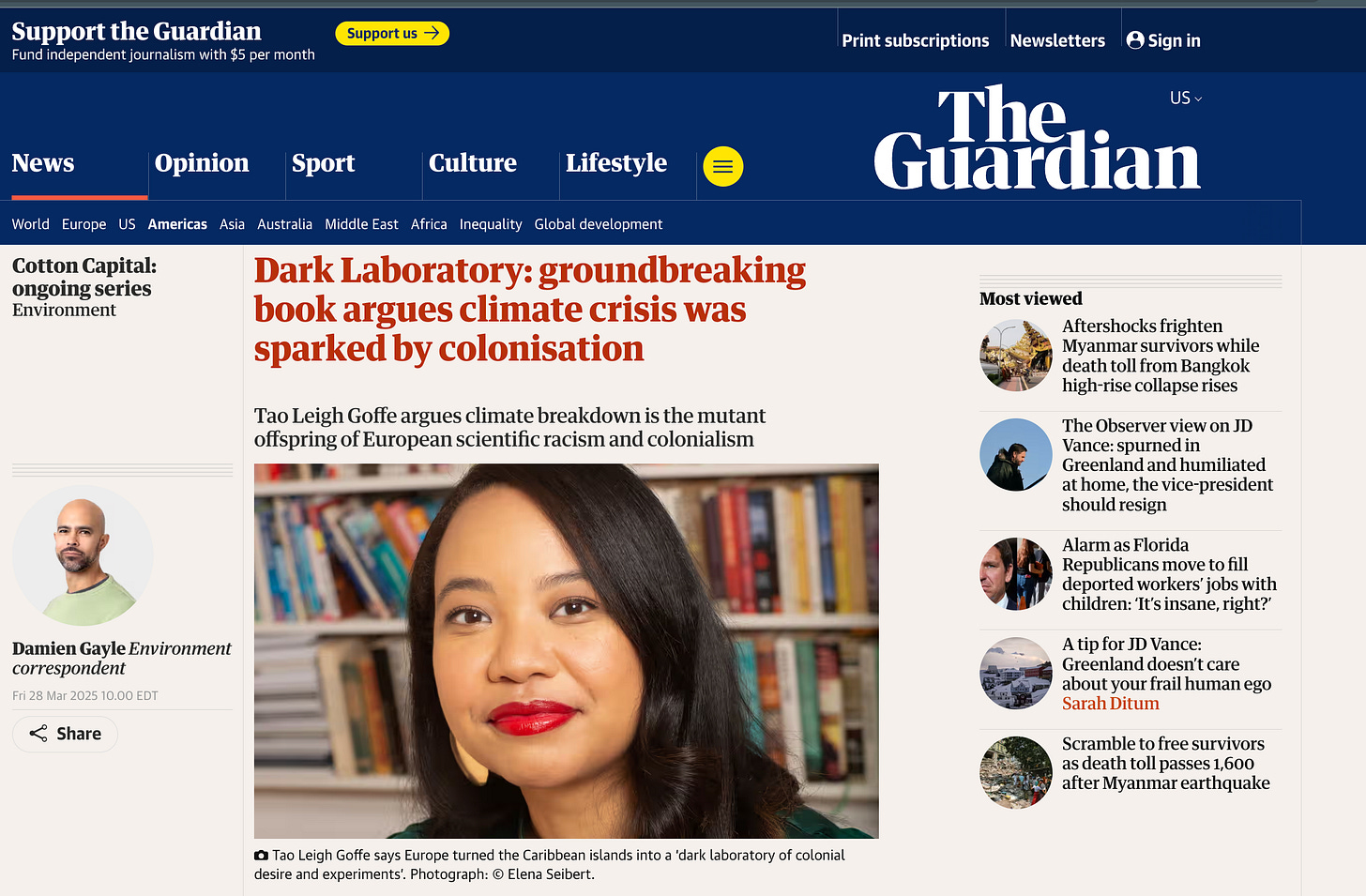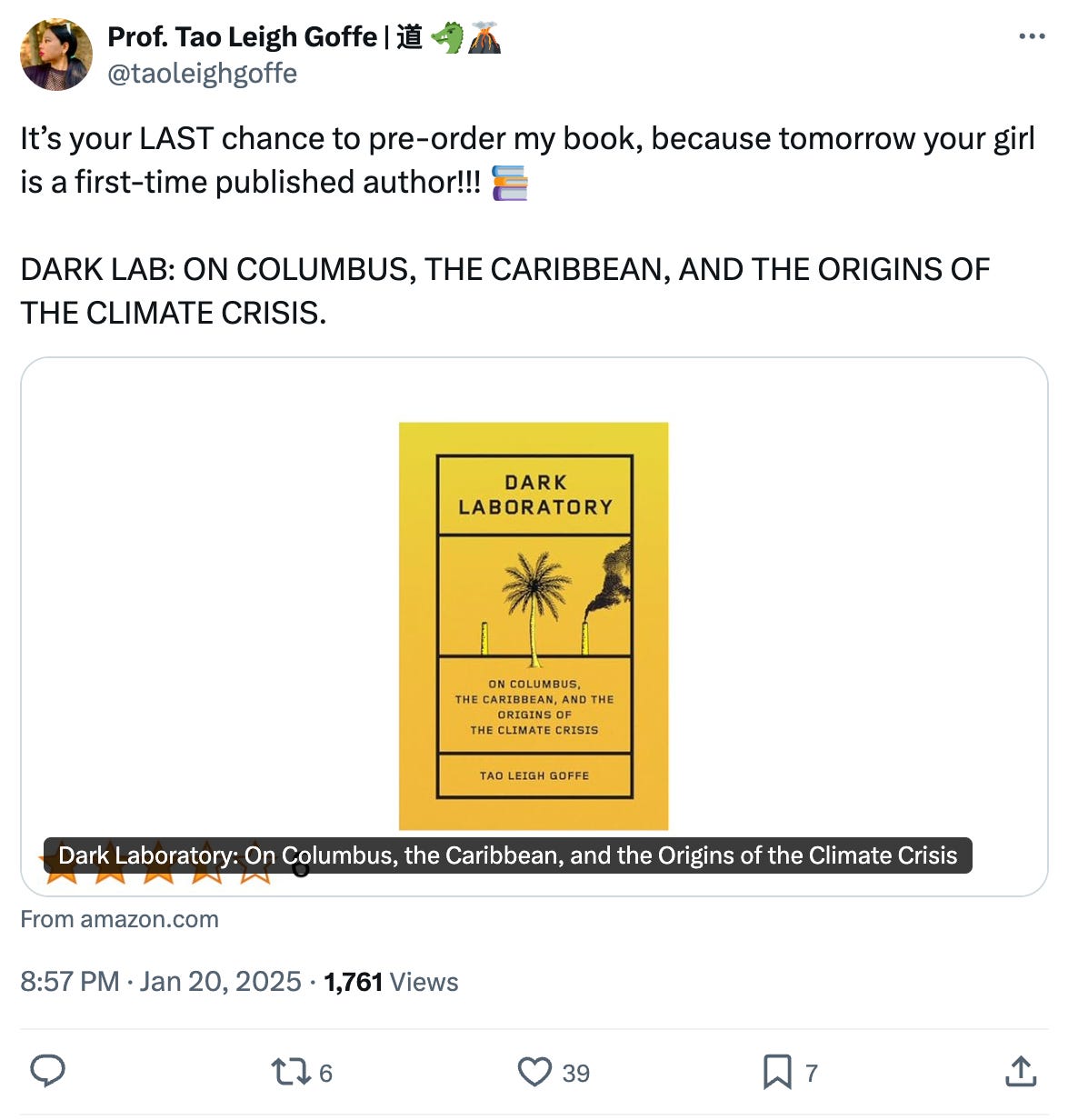1492 Parts Per Million
The Columbian Exchange Takes on a New Light
“it has been said that infinite monkeys with infinite typewriters would inevitably create the works of shakespeare.” - el gato malo
Move over, fossil fuels; there’s a new villain in town for climate hystericism.
He (because, yes, it’s always a he) fresh off a rat-infested ship wearing a funky hat, tunic, tights, and shoes that most likely cause the worst of blisters.
In a stunning revelation revealed by The Guardian’s not insufferable climate crisis journalist, Damien Gayle that’s sure to make your compost heap tremble, a new book titled Dark Laboratory On Columbus, the Caribbean, and the Origins of the Climate Crisis by “Dr.” Tao Leigh Goffe, an “award-winning writer, theorist, and interdisciplinary artist“ has bravely uncovered the true mastermind behind the climate crisis: none other than Christopher Columbus.

Yes, the white man who famously sailed the ocean blue in 1492 didn’t just discover stumble upon completely ruin the harmony of the “Americas” —he apparently kickstarted a global warming apocalypse with a side of monocrop agriculture and a dash of colonial swagger.
According to The Guardian’s glowing coverage of this "groundbreaking" tome, Goffe argues that Columbus’s arrival in the Americas was less a discovery and more the opening act of an environmental horror show. Forget (temporarily) the industrial smokestacks or SUVs Nazi Cybertrucks or gluing one’s self to highways, the real catastrophe began when Columbus and his crew decided to turn the Caribbean into their personal science fair project.
Monocrop agriculture? Check.
Deforestation? You bet.
Racial categorizations scribbled on parchment? Of course, as the word race didn’t come until later and from guess where?
After all, everyone knows this thanks to notable historian and scholar Neil Young:
Hate was just a legend
And war was never known
The people worked together
And they lifted many stones
Oh wait, that was about a different evil white guy from across the pond.
But nothing says "ecological disaster" like a guy with a quill pen and a superiority complex - the OG of it all - Columbus.
“Dr.” Goffe’s thesis, as breathlessly recounted by The Guardian’s not middle aged-white male Gayle, is that the climate crisis is the "mutant offspring" of European scientific racism and colonialism.
In fact it as sparked by Colonization. Get it? Sparked!
And isn’t just meant to be that Columbus’ Spanishized name Colón is awfully close to colony?
It’s a bold claim, one that imagines Columbus twirling his mustache with one hand, and the Che voui gesture with the other, while cackling, "Let's-a see how many ecosystems we can-a ruin before-a lunch, eh!"
Apparently, his experiments in the "dark laboratory" of the Caribbean—chopping down forests, planting endless rows of sugarcane, and sorting wildlife like a medieval Linnaeus—set the stage for today’s melting ice caps and sweaty summers and, of course ruined childhoods.
Who knew that the guy who got lost looking for India was secretly the architect of Category 5 hurricanes? Is it of any coincidence these ships more or less followed the trajectory of hurricanes?
The satire writes itself when you picture the scene: Columbus, standing on a pristine beach, muttering, “This sand is nice, but it’d look better with a strip mall/mine and a coal plant.” Meanwhile, his crew is busy clear-cutting mangroves to make room for the world’s first all-you-can-eat buffet of ecological destruction. According to Goffe, these acts weren’t just random colonial flexes—they were the blueprint for capitalism’s "slash and burn" ethos of which no indigenous groups ever did before. Forget the steam engine; the real industrial revolution started with a guy in tights yelling, “More sugar and spice, less trees!”
The Guardian swoons over Goffe’s visits to the Maroons and Indigenous Kalinaga people, where she reportedly unearthed "ecological understandings" that could save us all from the mess Columbus started. One can only imagine her scribbling furiously as a wise elder whispers, “The secret to fighting climate change? Plantains and good vibes.” It’s a charming image—less charming is the idea that we’re supposed to pin the last 500 years of atmospheric CO2 on a sailor who didn’t even know where he was half the time.
Let’s not kid ourselves: if Columbus were alive today, he’d probably be baffled by this rap sheet. “Climate crisis? I just wanted some gold and a shortcut to Asia!” he’d protest, before accidentally sailing his floating Cybertruck into Florida.
But no, Dark Laboratory insists he’s the original sin of our overheating planet, a one-man wrecking crew who turned paradise into a petri dish of doom. Never mind the intervening centuries of coal mines, oil rigs, and rush-hour traffic—apparently, it all traces back to that fateful October day in 1492 when Chris decided to drop anchor and doom us all.
In fairness, the book’s ambition is admirable. Why settle for mundane culprits like industrialization when you can point the finger at a historical figure already loathed by half the population? It’s a masterstroke of narrative convenience, like blaming the internet on Gutenberg or fast food on the guy who invented fire. And The Guardian laps it up, hailing Dark Laboratory as a radical reimagining of history—because nothing says "radical" like retroactively saddling a dead explorer with every modern woe.
So, the next time you’re sweating through a heatwave or dodging a wildfire, spare a thought for Christopher Columbus: the man who, according to this book, didn’t just colonize land—he colonized the thermostat.
Forget carbon taxes or renewable energy; the real solution might just be a time machine and a sternly worded letter to the Santa Maria. “Dear Chris please stick to piracy and leave the planet alone.” Or perhaps to Queen Isabella I of Castile and King Ferdinand II of Aragon, “Dear Queen and King, please don’t fund this crazy dude’s voyage into the sea monster-filled abyss. #STOPMUSLIMHATE”
Esteemed scholars Rage Against the Machine were perhaps onto something.
If only history—and satire—were that simple.
If you buy the book, make sure to maybe or maybe not purchase the book on Amazon and leave a stunning review.







New writing genre: Deepwoken sci fi
The climate loonies have lost the war against Carbon Dioxide and fossil fuels, so - predictably - they have adopted a new enemy: modern agriculture. Notice they pick an "enemy" that affects everyone on Earth so that by controlling that enemy, they can control everyone on the planet.